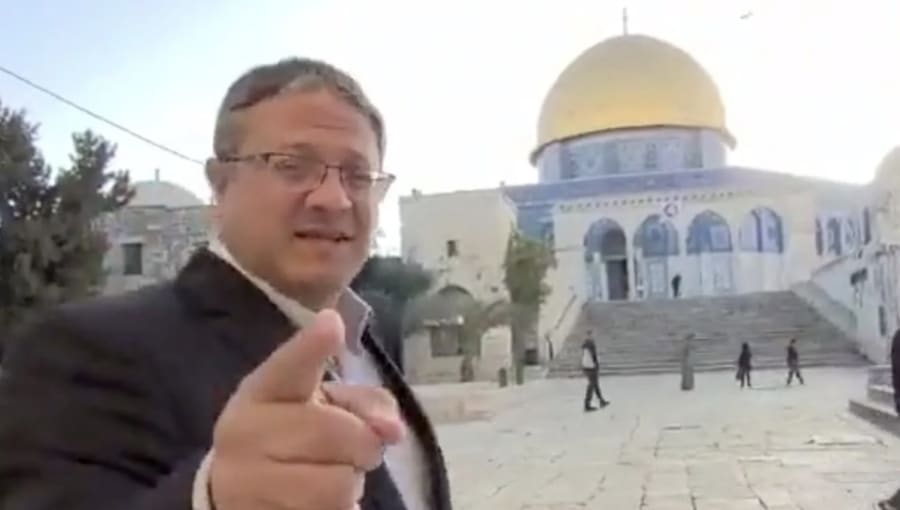The Temple Mount is the place to watch as a new government takes shape
Will far-right lawmakers touch the status quo and try to expand Jewish rights on the Jerusalem holy site?

A new government has yet to be formed under the presumptive prime minister, Benjamin Netanyahu, and already lines are being drawn in the proverbial sand about the status quo of the Temple Mount – a place of worship that frequently becomes a flashpoint site for violence.
Why is this coming to the surface now?
The new government is expected to be the most religious in Israel’s history with Likud, two ultra-Orthodox parties and the Religious Zionism slate, the surprise of the election with 14 seats.
Members of Religious Zionism, their followers and other Temple Mount activists have been calling for more access for non-Muslims to the compound and expanded Jewish rights on the holy site.
Any change, however, is liable to disturb the delicate and oft-mentioned status quo.
The “status quo” essentially holds that only Muslims are allowed to pray at the Al-Haram al-Sharif (the name used by Muslims for the site).
But in a nation where freedom of worship is protected, some Jews argue that, despite the Muslim shrines there, they should be able to pray at what is considered the holiest site of Judaism. And many do pray, most quietly, during regulated visits of the site.
Some even make it a point to go up to the Temple Mount whenever it is open to the public in order to establish a Jewish presence there.
TO PRAY OR NOT TO PRAY
At times, these visits end up in scuffles or arrests especially when tensions are already heightened around the country during controversial holidays or waves of terror.
In fact, Jews are legally allowed to pray according to an Israeli court ruling, but the judge also deferred to police who supervise the site saying, “This [decision] does not intervene with the police’s job in enforcing public order at the Temple Mount, nor does it determine anything regarding freedom of worship at the Temple Mount.”
One such activist who recently ascended the site on Tisha B'Av – a somber day on the Jewish calendar – is Jewish Power leader Itamar Ben Gvir, who said it is necessary to “remind everyone that we are the owners of the holiest place for the people of Israel.”
Now, the No. 2 on the Religious Zionism slate is likely to wield substantial power in the upcoming government.
In an interview with The Times of Israel before the election, he said that “racism on the Temple Mount” is what is violating the status quo.
“A Jew who prays on the Temple Mount gets arrested. Why are Arabs allowed to pray and Jews are forbidden to pray? This is racism against Jews. I want equal rights. It can’t be that [the rights] of Jews are harmed just because they are Jews,” he said.
Amid a record number of Jewish visitors to the site (6,000) during the Jewish holidays this fall, another Knesset member from the Religious Zionism party, Simcha Rothman, blew a shofar at a Muslim cemetery adjacent to the Temple Mount.
In April, police arrested four Jews who were planning to sacrifice a goat on the Temple Mount ahead of Passover – an act that could have triggered Palestinian violence during the month of Ramadan.
Moves like this are viewed by Palestinians as provocative and have been used as an impetus for violence and rocket launches at Israel.
DOMESTIC AND INTERNATIONAL BACKLASH
With the election results becoming clear and a new right-wing bloc expected to form the coalition, Jordan warned that any change to the status quo could have a deleterious impact on its relations with Israel.
“Any attempt to change the status quo on the Temple Mount will definitely harm ties between Jordan and Israel,” a Jordanian source was quoted by Israel’s Kan broadcaster as saying.
Despite being now geographically in the State of Israel since 1967, when Israel after the Six-Day War gained control of all of Jerusalem, the site is under the custodianship of the Kingdom of Jordan, though policed by Israel.
Jordan is watching since Ben Gvir wants to be the next public security minister – a position tasked with setting and carrying out Israeli policy on the Temple Mount. Currently, the police restrict Jewish prayer for security reasons.
A member of Israel’s outgoing coalition, Ra’am party leader, Mansour Abbas – who is Muslim – also expressed fear that the new government would consider allowing Jewish prayer on the Temple Mount – a move that “will lead to war.”
“When you’re talking about the most sensitive subject which is the holy sites… people’s minds stop working and religious feelings take over,” he said in an interview on Channel 12. “We’ve seen how many rounds of escalation were sparked by provocations at Al-Aqsa Mosque.”
Another strong opponent to changing the status quo or allowing Jewish prayer on the Temple Mount will be – surprisingly – from Netanyahu's own government. The ultra-Orthodox parties, Shas and United Torah Judaism, are opposed because no one knows the exact location of the original temple – and they don't want to risk violating the site.
For them, it is forbidden by Jewish law.

Nicole Jansezian was the news editor and senior correspondent for ALL ISRAEL NEWS.












